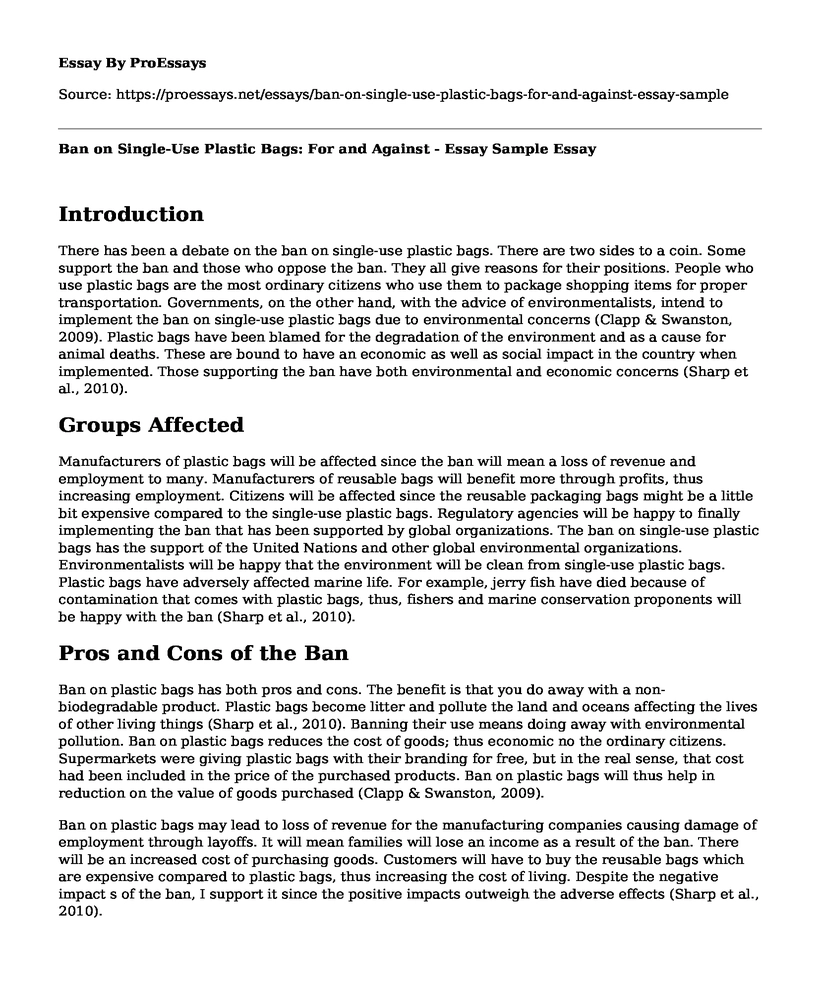Introduction
There has been a debate on the ban on single-use plastic bags. There are two sides to a coin. Some support the ban and those who oppose the ban. They all give reasons for their positions. People who use plastic bags are the most ordinary citizens who use them to package shopping items for proper transportation. Governments, on the other hand, with the advice of environmentalists, intend to implement the ban on single-use plastic bags due to environmental concerns (Clapp & Swanston, 2009). Plastic bags have been blamed for the degradation of the environment and as a cause for animal deaths. These are bound to have an economic as well as social impact in the country when implemented. Those supporting the ban have both environmental and economic concerns (Sharp et al., 2010).
Groups Affected
Manufacturers of plastic bags will be affected since the ban will mean a loss of revenue and employment to many. Manufacturers of reusable bags will benefit more through profits, thus increasing employment. Citizens will be affected since the reusable packaging bags might be a little bit expensive compared to the single-use plastic bags. Regulatory agencies will be happy to finally implementing the ban that has been supported by global organizations. The ban on single-use plastic bags has the support of the United Nations and other global environmental organizations. Environmentalists will be happy that the environment will be clean from single-use plastic bags. Plastic bags have adversely affected marine life. For example, jerry fish have died because of contamination that comes with plastic bags, thus, fishers and marine conservation proponents will be happy with the ban (Sharp et al., 2010).
Pros and Cons of the Ban
Ban on plastic bags has both pros and cons. The benefit is that you do away with a non-biodegradable product. Plastic bags become litter and pollute the land and oceans affecting the lives of other living things (Sharp et al., 2010). Banning their use means doing away with environmental pollution. Ban on plastic bags reduces the cost of goods; thus economic no the ordinary citizens. Supermarkets were giving plastic bags with their branding for free, but in the real sense, that cost had been included in the price of the purchased products. Ban on plastic bags will thus help in reduction on the value of goods purchased (Clapp & Swanston, 2009).
Ban on plastic bags may lead to loss of revenue for the manufacturing companies causing damage of employment through layoffs. It will mean families will lose an income as a result of the ban. There will be an increased cost of purchasing goods. Customers will have to buy the reusable bags which are expensive compared to plastic bags, thus increasing the cost of living. Despite the negative impact s of the ban, I support it since the positive impacts outweigh the adverse effects (Sharp et al., 2010).
I support the ban on single-use plastic bags. It will reduce environmental pollution, which directly means taxes will be used in other sectors as opposed to environment cleaning. The economic principle at play is that tax money used to pay for the collection of non-biodegradable plastics can be put in different sectors such as health. It will also reduce the need for increased taxation (Clapp & Swanston, 2009).
As a citizen, I would take the action of lobbying the local authorities to use the money saved by banning plastic bags in the health sector. It is a sector that impacts everyone directly, and the citizens should be able to realize the benefit of banning plastic bags directly. Health sector would directly impact the citizens positively as a result of banning the use of plastic bags.
Conclusion
Let us adopt the use of reusable plastic bags, and everyone, including marine animals, will live in peace and health. Use of plastic bags benefits no one apart from the manufacturing companies who get profits. Reusable bags are environmentally friendly and should be encouraged.
References
Clapp, J., & Swanston, L. (2009). Doing away with plastic shopping bags: international patterns of norm emergence and policy implementation. Environmental Politics, 18(3), 315-332.
Sharp, A., Hoj, S., & Wheeler, M. (2010). Proscription and its impact on anticonsumption behavior and attitudes: the case of plastic bags. Journal of Consumer Behaviour, 9(6), 470-484.
Cite this page
Ban on Single-Use Plastic Bags: For and Against - Essay Sample. (2023, Feb 15). Retrieved from https://proessays.net/essays/ban-on-single-use-plastic-bags-for-and-against-essay-sample
If you are the original author of this essay and no longer wish to have it published on the ProEssays website, please click below to request its removal:
- Research Paper on How People Understand Feminism in the Society
- Essay Sample on Drug-Induced Psychosis
- Article Analysis Essay on How Obama Failed Black Americans
- Research Paper on Empowering Girls Through Education: A Path to Sustainable Development
- Paper Example on Air Pollution in the US: 2018 Data & Overview
- Gang Affiliation & Delinquency: A Linked Reality - Essay Sample
- Paper on Child Abuse Reporting in Schools: Legal Obligations, Identification, and Reporting Procedures







